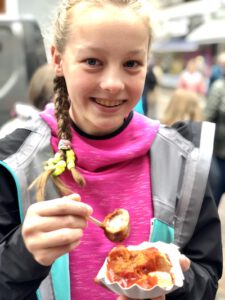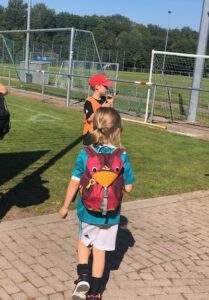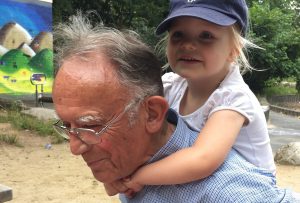Update – this is part 2 of a three part series. Click on links to read Part 2: The first few months and Part 3: Building Connections.
We landed in Germany on 28. August with 11 suitcases and 5 carry-ons. We’d been living abroad for 8 years. During this time we had kept our apartment in southern Germany, but because Tom’s family lives in central Germany we never spent much time there. We only lived in this area for four short years (with one and then two babies to keep us very busy) and didn’t have a strong network of friends. We landed but there was no “welcome home” group at the airport eager to have us back, no dinner waiting for us, no fridge stocked by friends happy to see us again.
Instead we picked up our rental car. We loaded it up with the girls and as much luggage as it could possibly take and I drove to the apartment. Meanwhile Tom took our (tired, jetlagged) son and the rest of the bags on the subway. The plan was I would drop the girls and all the bags and then return to the last station on the line to collect the boys. Spoiler alert: we had no working phones yet.
Unpacking the car took longer than expected. I ended up on the wrong side of the subway line and drove around in circles trying to get to the other side. By the time I finally found them they were more tired and grumpy than before. I was near exhaustion and tears myself and the girls had been alone for quite a while. But we all made it back and crashed. Welcome home?
The next days were a flurry of unpacking, finally getting to walk through our new house – still a construction site – visits to IKEA and hardware stores (where we discovered free WIFI so the kids were happy to connect with friends while we shopped) and grocery shopping.
I had been looking forward to stores where I could read the labels and understand the specials but found myself completely and utterly overwhelmed. The tomato selection alone seemed endless and stumbled back out with only the bare minimum. Crushed. Day 2 and I already had reverse culture shock.
When I opened the mailbox on Day 3 to find a card from my sister-in-law welcoming us home I burst into tears. It was such a thoughtful thing to do and at that point it meant very much to me. That night we went out for Döner Kebabs and ice cream. I was surprised to realize that the kids had never had Döner so we needed to fix this asap. They loved them and funnily Döner has become a “treat” dinner for us now. A new discovery and baby steps towards making this place familiar.

By Day 4 most of the suitcases were somewhat unpacked, jetlag was starting to wear off and a semblance of routine was setting in. I hauled myself out of bed early, laced my shoes and went for my first run back in Germany. Crisp morning air, blue sky, the sun rising over fields of green, a forest alive with early morning birdsong, a hare, a squirrel. This is what I had really been looking forward to. This was on my list of positives for Germany. I wasn’t disappointed and my spirits lifted.
A week after our arrival all three kids started soccer camp. When researching clubs and activities we’d found this camp and it seemed a great way to test the waters of German kid culture and maybe get to know a few people before school started. The camp was definitely an eye opener. Halfway through the week our son remarked: “German children here are different from German children in Beijing.” Agreed. I hoped it would prepare them a little bit for the start of school the following week.
We had one more weekend before school started and we spent Saturday with friends from Beijing. Seeing people who knew us, knew our story, whom we didn’t have to explain ourselves to in any way, was such a relief that it still stands out as a highlight of those first weeks. It gave us another much needed sense of familiarity.

Last week I outlined some advice for moving to a new place. In our first weeks of repatriation we touched on these points:
(1) Prepare as if it were a new assignment – because for the kids it just might be. In the first weeks this meant trying “new” food, explaining how parking meters, bottle return machines and grocery cart deposits worked.
(2) Research clubs – Soccer camp gave us a start and also helped in the decision if they wanted to continue with soccer or find a different sport.
(6) Check–in with each other. As a family we talked about how we were doing and what was happening, how sad we were sometimes and the people we were missing. Friends from Beijing also checked-in on us, which felt tremendously supportive.
(7) Self-care. As soon as I felt able, I went running. This is a self-care strategy that works for me and that I try to use as often as possible to clear my head and ground me. When I feel better, I have more resources to support those around me.
Do you know your self-care strategies? What small thing can you do to feel more calm and in control wherever you are? Identifying these in times of low stress can help you pull them out of the hat when things get tough. Because those are the times when we need to pay special attention to taking care of ourselves so we have the strength and resilience to take care of others, too. During a move or any other transition.





